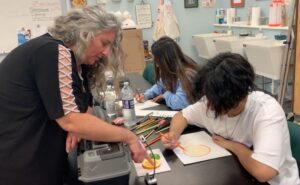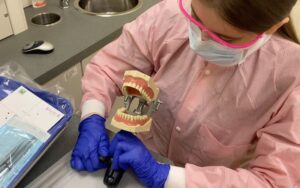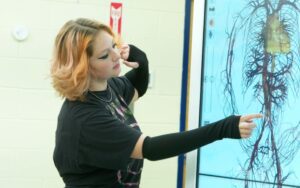
Teresa De Sapio Diaz, a commercial arts and advertising design instructor at Hunterdon County Polytech, helps her students launch freelance design businesses to test out a career as an artist.
February is Career and Technical Education (CTE) Month, an ideal time to brighten the spotlight on the state’s career-focused education. But to fully capture the modern experience at NJ county vocational-technical schools, we need quite a big spotlight.
The depth and breadth of programming offered at these schools continues to grow, yet many still have a limited view of CTE.
To show today’s CTE in action, the New Jersey Council of County-Vocational Technical Schools (NJCCVTS) kicked off the month with a new video available on the homepage of careertechnj.org.
We also focus this month’s Career Classroom on the standout features of a NJ county vocational-technical school education, using the words and experiences of those most closely tied to the schools to showcase the realities of CTE in NJ:
Early Career Exploration and Connections to the Workforce
The idea of exploring a career in high school helps students set clearer goals early on, which can save them both time and money. When county vocational-technical students graduate, they have had enough exposure to one career field to know if they are on the right track or if they need to adjust.
In the classroom, students benefit from learning in customized spaces that are equipped with the same tools used by professionals. They also learn from teachers with extensive industry experience who share their technical know-how, as well as insights about employer expectations, career pathways, and job opportunities.
At Hunterdon County Vocational School District (HCVSD), Instructor Teresa De Sapio Diaz encourages her commercial arts and advertising design students to explore making a living as artists. Through what is known as the Bridging the Gap Program, her students receive guidance from Hunterdon County Rotarians to launch freelance businesses.
“They design their own logos, resumes, a 16-page marketing plan; they work with a mentor; they go to an employment fair and get jobs for freelance, negotiate prices and write legal contracts so they actually get paid to work as an artist,” she explained.
Students build their resumes, but they also learn the fundamentals of entrepreneurship and often gain clarity about pursuing a career in the arts.
The direct involvement of employers in providing work-based learning also helps many students gain clarity about their futures.

Ayesenur Turkmenoglu, a dental occupations student at Burlington County Institute of Technology, applies what she learns in her customized high school classroom directly to her job at a dentist office.
Ayesenur Turkmenoglu, a student in the dental occupations program at Burlington County Institute of Technology (BCIT), said Dr. Patel and the team at South Jersey Smiles in Moorestown welcomed her into their office when she was just a sophomore.
“Working helped me understand the class better, and being in class helped me understand work better,” Turkmenoglu said.
Turkmenoglu plans to continue working while gaining the credentials needed to become a dental hygienist. This is among her first steps toward becoming an oral surgeon. She said many BCIT high school and adult students, as well as alumni, work with her at South Jersey Smiles, continuing to hone their skills while helping the practice fill in-demand dental assistant and office roles.
Opportunities to Get a Head Start with College Credits, Industry Credentials and Apprenticeships
Strong articulation and dual enrollment agreements with college and university partners enable many county vocational-technical students to earn college credits while still in high school at little or no cost to their families. This head start reduces the time and expenses for students to earn a two-or four-year post-secondary degree.
Sophia Datz, an allied health student at Gloucester County Institute of Technology (GCIT), expects to graduate high school with all 60 credits for an associate degree. “I really appreciate being able to get the leg up and learn all I can, not just an introduction,” she said of the depth of college curriculum she has already tackled. “It does give me a certain confidence to be on level with college kids; I like the feeling of preparedness it gives me.”
In addition to this confidence boost, Datz also appreciates the cost savings of accumulating college credits in high school. She will apply those to the next leg of her long academic journey to become a radiologist or orthopedist.

Sophia Datz, an allied health student at Gloucester County Institute of Technology, benefits from high-level coursework both in high school and at Rowan College of South Jersey. She will earn an associate degree at the same time as her high school diploma.
“When I graduate, I’ll have at least 16 college credits, and OSHA 10 and OSHA 30, plus certificates in CareerSafe,” added Omari’anna Jones, a carpentry student at Essex County Donald M. Payne Sr. School of Technology. The Occupational Safety and Health Administration (OSHA) and CareerSafe certifications help students enter the workforce better prepared to avoid health and safety hazards.
Like Jones, many county vocational-technical students accumulate both college credits and these important industry credentials as part of their high school curriculum. These students graduate ready to go to work.
“I actually have my OSHA 10, so if I go into the workforce now, I’m more likely to get hired,” Jones added. “Once you get OSHA 30, they teach you it’s an automatic hire; it’s an easy job coming out of high school.”
Apprenticeship opportunities represent yet another option for county vocational-technical students looking to jumpstart their careers. Labor unions have long valued apprenticeship as a way to train a future workforce, but today, employers beyond the construction trades are embracing paid apprenticeships. These combine on-the-job training with classroom learning. Students earn while they learn and work toward transitioning their skills into a well-paying career.
Jamel Williams, an alumnus of Essex County Donald M. Payne Sr. School of Technology, is currently an apprentice with the International Alliance of Theatrical Stage Employees (IATSE), more commonly known as the Stagehand Union.
“I started working almost immediately after graduation,” Williams said of his apprenticeship. “And it just provides me with a lot of experience, a lot of real-world connections with other people.”
Williams adds that the apprenticeship opened his eyes to a new career option and put him well ahead on a path toward an exciting future full of travel, new people, and a front-row seat at memorable shows.
Training for In-Demand and Emerging Careers
Employer partnerships are yet another reason why NJ county vocational-technical schools prepare students to transition into college or right into the workforce. Employers consult on curriculum or classroom equipment to ensure students are learning relevant skills. They often provide insight into programs needed to meet current and future labor demands. They open their doors for work-based learning and give students a connection to the real-world when they graduate.
Stelton Cabinet & Supply Co., out of Piscataway, initially connected with Middlesex County Magnet Schools to begin building an employee pipeline. Today, many of the same entry-level carpenters the company hired straight out of high school are now the mentors, training current students engaged in work-based learning with the company.
“It hurts business not to have a ready workforce,” said Kathy Aiello, who owns Stelton with her husband, Bob. “That is why we are willing to employ a student with common sense skills, aptitude, and understanding of concepts related to building. Having students from Middlesex County Magnet Schools has been a very positive experience.”
Stelton was recently recognized by Middlesex County Magnet Schools as a Business Partner of the Year. Each of the 21 county vocational-technical schools takes part in the annual award program, which emphasizes the importance of employer involvement in career programs across the state. It helps sustain relationships and recruit new partners to support their respective county vocational-technical district.
New Jersey’s county vocational-technical schools are already strong, but as awareness grows and new partnerships develop, CTE in New Jersey will become even more valuable to the students who seek career-focused programs, the employers looking for skilled workers, and all of us who benefit from a strong, sustainable state economy.
Read this column as it originally appeared Feb. 22, 2023 in ROI-NJ.



